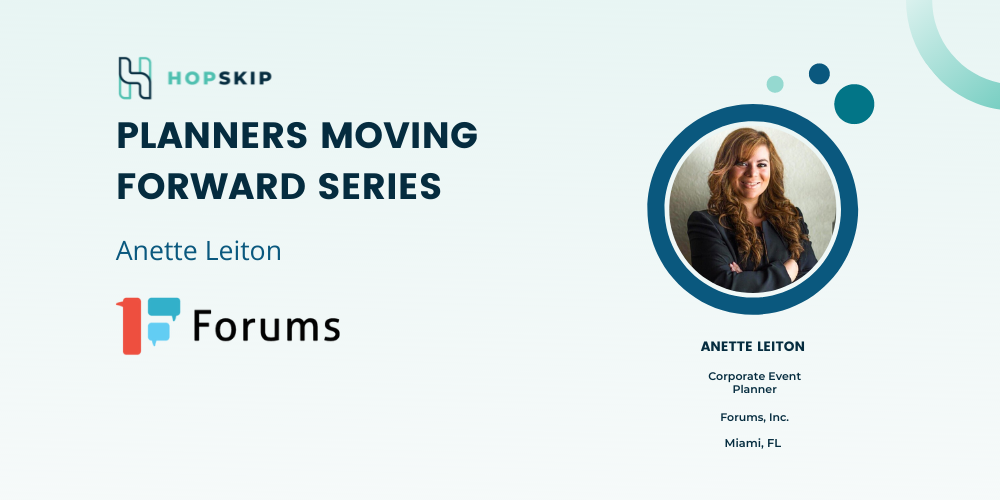This post is part of the HopSkip Planner Spotlight Series where HopSkip spotlight's planners across the industry to bring awareness of how they adapted to COVID-19, communicating and lessons learned and sharing how they are viewing the meetings and events industry in a post-pandemic world.
Name: Anette Leiton
Company Name: Forums, Inc.
Job Title: Corporate Event Planner
Years of Experience: 10+
How do you think you are positioned, after months of persevering with the pandemic, to take advantage of our new and disrupted meetings/events landscape?
As a company we had to reinvent ourselves. After being so used to in-person events, we had to re-think and strategize our event formats, in order to persevere through the pandemic. We were challenged to provide our clients with exceptional ways of reaching their employees and clients, via exciting and entertaining events, that were at the same time safe and accessible from everywhere and anywhere. This is where Forums (who already had an existing virtual/webinars division) pivoted, accelerated, enhanced, and expanded their virtual events division, which promised to keep our clients safe, and guaranteed a further audience reach. Some clients learned that in one virtual event guests could join worldwide, vs. the in- person events that were catered to each country individually; and the expense in return was lower, when doing a virtual event vs. an in person event in some occasions. I think after strategizing and re-inventing ourselves we have uncovered new and essential skills and client's needs that can take us to the next level in either event format, whether in-person, virtual or hybrid, we are ready now, more than ever.
As our community moves forward with planning in-person meetings, what new technologies or processes are you implementing that you may have not looked at before?
We have implemented so many new and fun technologies to our platforms such as: interactive invitations, having someone from the company (high executive) personally invite guests to the events; this is done through different software implemented by our partners. We have also developed new and exciting virtual games that have worked so well for employee awareness and engagement. Finally, we have implemented the use of QR codes, these can help in easily registering to an event, accessing surveys, flyers, or any other important information; amongst many other technologies that have made us stand out from the rest.
As we see virtual meetings transition back to face to face, hybrid meetings are beginning to be the vehicle to return to normalcy. What are your thoughts on hybrid meetings versus traditional fully in-person meetings?
I believe the hybrid format still provides a higher audience reach for various reasons. In some occasions, the client's budget may only allow to include some clients and/or employees to attend their in-person face to face events, but migrating to a hybrid format may still allow to reach a higher audience by inviting those not able to fly, or attend in-person, in return making them feel valuable and included. Also, it allows the message to be sent to more than one audience in person, and virtually. Even though I definitely feel that face-to-face events are extremely important to convey a message and push for that human interaction, and networking, it is safe to say that our world has changed and shifted in a way where in order to send a message quicker without losing that human touch; hybrid may be the way to go. With the Hybrid Format you will also have more accessibility to mayor celebrities, important executives or speakers, as they can make appearances to an audience from anywhere and everywhere in a hybrid mode.
In your opinion, what do you think the biggest value for your attendees is in regards to returning to live events?
I definitely think the value is in human interaction and networking. As much as virtual events provide a platform that reaches a bigger audience, in-person events are needed for human interaction, networking and closing on businesses. The best business decisions have sometimes been done at events or over corporate dinners.
As the pandemic fades away and we return to face-to-face events what do you hope changes, either for planners or hoteliers, in the traditional RFP and proposal process as a result of all of the learnings from the last 20+ months?
I really hope that the response time on RFP changes. I know due to the pandemic several places were short staffed, so you had one person sending several proposals at one time. Recently, I was planning an in-person event in Puerto Rico, and what I notice was that a response on a proposal that normally would take at maximum 24 hours, was taking weeks and from all the venues, hotels and vendors I was quoting. All that time lost definitely puts the timeline of events at risk. I really hope as we start stepping back into face to face events, that the turnaround on proposals goes back to being fast and efficient, to provide our clients with the fast and efficient customer service they deserve and count on, in order to have their events flow and executed on time.
This post is part of the HopSkip Planner Spotlight Series where HopSkip spotlight's planners across the industry to bring awareness of how they adapted to COVID-19, communicating and lessons learned and sharing how they are viewing the meetings and events industry in a post-pandemic world.
